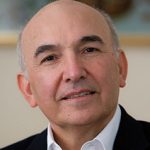The paper contributes to the growing global VAR (GVAR) literature by showing how global and national shocks can be identified within a GVAR framework. The usefulness of the proposed approach is illustrated in an application to the analysis of the interactions between public debt and real output growth in a multi-country setting, and the results are compared to those obtained fromstandard single country VAR analysis. We find that on average (across countries) global shocks explain about one third of the long-horizon forecast error variance of output growth, and about one fifth of the long run variance of the rate of change of debt-to-GDP. Evidence on the degree of cross-sectional dependence in these variables and their innovations are exploited to identify the global shocks, and priors are used to identify the national shocks within a Bayesian framework. It is found that posterior median debt elasticity with respect to output is much larger when the risein output is due to a fiscal policy shock, as compared to when the rise in output isdue to a positive technology shock. The cross country average of the median debt elasticity is 1.58 when the rise in output is due to a fiscal expansion as compared to 0.75 when the rise in output follows from a favorable output shock.

Authors
Alexander Chudik
Federal Reserve bank of Dallas, Research Department

Research Fellows
Mohammad Hashem Pesaran
Emeritus Professor of Economics at University of...

Research Fellows
Kamiar Mohaddes
Macroeconomist, Judge Business School, University of Cambridge


